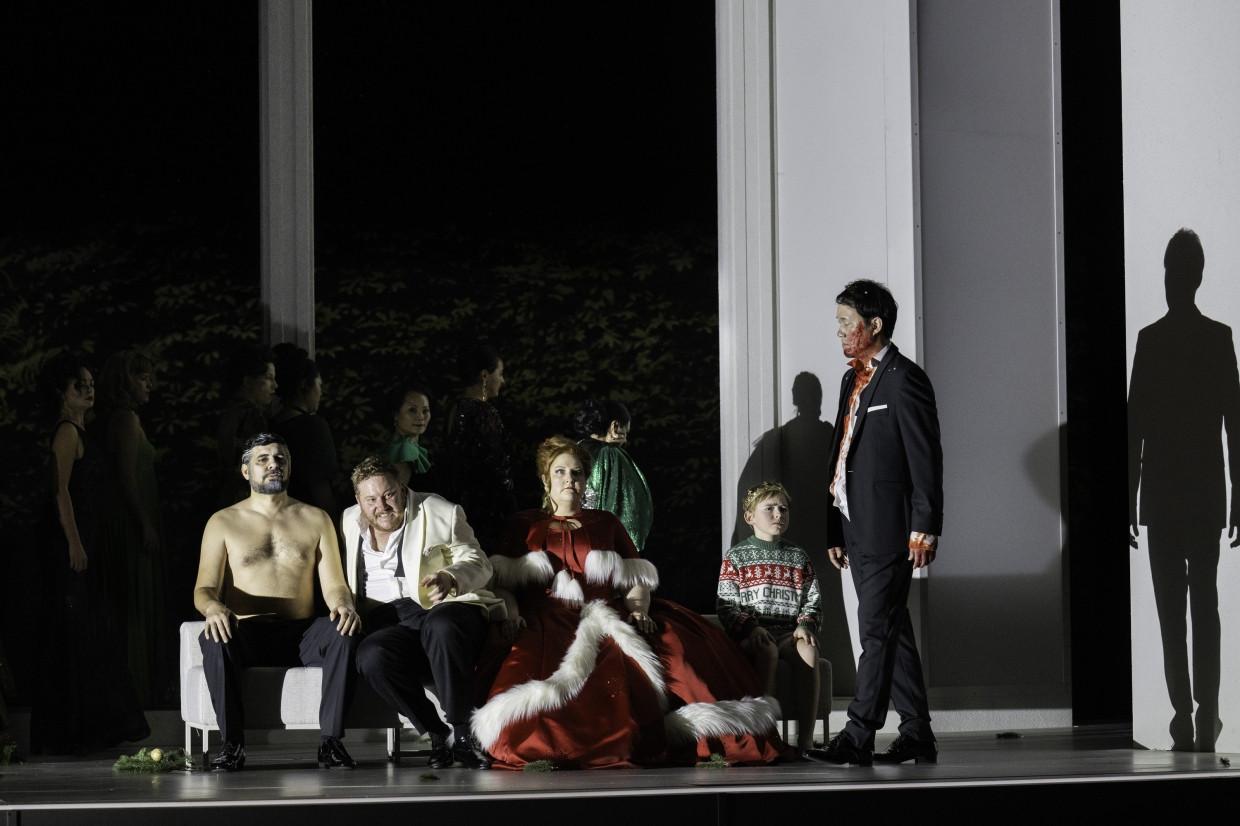Im Italienischen liegen das Verbrechen – delitto – und das Vergnügen – diletto – klanglich nah beieinander. Buchstaben, Silbenzahl und Betonung sind vollkommen gleich, nur die Abfolge der ersten zwei Vokale ist gegeneinander vertauscht. Da muss man ein feines Ohr haben, um die Bedeutung zu unterscheiden. Auch in Giuseppe Verdis Oper „Macbeth“ liegen Verbrechen und Vergnügen geradezu kitzlig nah beieinander. Thomas Guggeis, der Generalmusikdirektor der Oper Frankfurt, versteht es, diese Nähe musikalisch auszukosten.
Solisten und Chor, der durch Manuel Pujol lobenswert vorbereitet worden ist, wissen am Ende des zweiten Aktes, dass schmutzige Geheimnisse im Raum des Bankettsaals stehen, dass Schottland kein guter Ort zum Bleiben ist, dass Verbrechen geschehen sein müssen; sie sprechen es sogar alle aus, aber sie haben Spaß dabei! Verdi hat die Hauptzählzeiten des Viervierteltakts in Achteltriolen unterteilt, sodass ein beschwipster Walzer in E-Dur entsteht. Guggeis hält – eins, zwei, drei – die Mechanik des Entertainments fest im Griff, um dann auf dem melodischen Höhepunkt das Tempo zu drosseln, aber die Lautstärke aufzudrehen: Das ist Seligkeit, Genuss, das Abbremsen vor dem Höhepunkt auf der Achterbahn, bevor die Abfahrt kommt. Guggeis beschreibt durch sein Dirigat, das den großen Apparat souverän zusammenhält, dass nicht nur die Lust eigenes Grauen, sondern das Grauen eigene Lust hat. Die amüsieren sich alle zu Tode!
Das Frankfurter Opern- und Museumsorchester steht dem Schroffen und Schrundigen bei Verdi freilich fern. Der Klang bleibt gut abgemischt, immer warm grundiert; alles Schrille und Rohe wird hier veredelt.
What may be lacking in external sharpness, the orchestral sound gains in internal tension. Guggeis knows how to stretch pauses shockingly, create tight connections and listen to the horror of the filler voices: When Lady Macbeth urges her husband to murder Banquo after King Duncan, we can almost hear the bowels of malice creaking in the middle and low strings. The lust for power takes on an animal, physical dimension here, which is explored purely through the music. We are exposed to the digestive noises of political ambition. It is Verdi who came from man – Aristotle as zoon politikonas a political animal, described – just that zoonthe animal brings out.
Nicholas Brownlee lets us experience through his singing that Verdi composed the destruction of a vocal physiognomy in Macbeth, as he later did in “Otello”. Brownlee, who was already seen in Frankfurt as Hans Sachs, has – despite all his strength – a baritone so light-footed that he would still make a lively Don Giovanni. He can sing very beautifully, but then, in the ghostly apparitions of the second act, in the witch picture in the third and in the finale of the fourth act, he deliberately and effectively raises the notes with a throaty creak, so that you can tell that his voice is being eaten away by his own conscience.
Signe Heiberg steps in as Lady Macbeth
Tamara Wilson plays Lady Macbeth – really great, by the way, in the satirical, nasty Santa Claus dress by Doey Lüthi – with casual comedy. But on the premiere day she lost her voice after a long infection, which is why Signe Heiberg sings the role from the sidelines in the semi-darkness – but how! It has glow and shine! She gives the jumps and trills of her drinking song at the banquet a perverse brilliance. And in the nightwalker scene in the fourth act, Heiberg delivers a study of insanity by singing out the first parts of the sentence in full voice, only to take the second parts back in half voice. The division of the person is evident in the sounding syntax.

Kihwan Sim, who has already brought joy to the house as Mozart's Figaro, gives the Banquo an engaging elegance. Deep male voices of such cleanliness and suppleness are precious. And Matteo Lippi also turns Macduff's relatively short solo appearance into an impressive event with his melodious, strong and flexible tenor and his dramatic seriousness.
RB Schlather's production moves the action from eleventh-century Scotland to the land somewhere in our immediate present. In the revolving interior of a monumental bungalow, which Etienne Pluss has designed quite attractively, a pleasure-competent performance bourgeoisie meets between tennis and party, Halloween children's festival and Christmas banquet. But who this Macbeth and his lady might be today, what drives them and what their power would be – we don't find out. Roland Horvath's videos, which can only be seen on the flat-screen televisions in the living and dining rooms, show cartoons of skeletons playing tag with their skulls. At the end, news images are shown of destroyed cities in which, according to a text scroll, many children are said to have died in air raids. Could be Syria or Gaza, not Ukraine, anything, it doesn't seem to matter to Schlather.
It then takes revenge to fashionably relocate a royal tragedy by William Shakespeare and Giuseppe Verdi to the present day. What “king” and “retainer” (Than) meant during the millennium of Christian monarchy in Europe did not previously need to be specifically explained. The transfer into the sphere of fairly undifferentiated civility requires explanations in order to be able to maintain the dimension of the tragic, i.e. the destruction of state order through personal guilt. We owe this explanation thanks to Schlather's clever, amusing arrangement.










